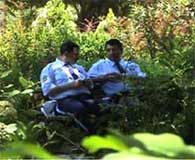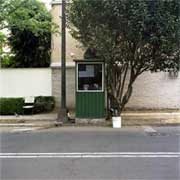Nicoline van Harskamp has done an extensive research on both public and private security guards and police forces in Amsterdam, Glasgow, Berlin, The Hague, Istanbul, London, and Rotterdam. Her project was different for each city.
The Istanbul version addressed issues of (the privatisation of) street surveillance with a group photo shoot of different private guards, a video piece and a “Little Guide to Istanbul guards” booklet.
In the Turkish city every street is ‘owned’ by the people that live and work there. Many Istanbulites pass the time waiting and watching. This system of urban social monitoring makes the city with 15 million people virtually street crime and vandalism free. Nevertheless, (military) police officers, municipal guards and soldiers also have a strong public presence.


An unusually high number of private security people is present around public spaces like parks and bridges. There is no formal legislation restricting the privatisation of public safety and the guards themselves have no more rights or power than any other person in the street.
Her Istanbul video documented an experiment for which van Harskamp employed two men to spend 12 hours in the streets doing nothing. The team was dressed in special uniforms and wore false I.D. cards. They became traffic police on busy crossings, Zabita officers on Galata bridge, tourism police in Sultanahmet, boat attendants on the ferry, etc. and the public reacted to them accordingly. The team surprisingly easily made friends with other uniformed people. Hands were being shaken with police officers, soldiers and ‘colleagues’ from special security companies. Some of them just wanted to know how much they were earning and if they could get a job with the company.
More on private guards, but in Mexico this time:
 The Casitas: mexico city security huts series examines the structures built to provide shelter for the security guards Mexico City’s wealthy neighborhoods (Lomas de Chapultepec).
The Casitas: mexico city security huts series examines the structures built to provide shelter for the security guards Mexico City’s wealthy neighborhoods (Lomas de Chapultepec).
These photographs depict the architectural/cultural dichotomy of having a 10 sq. ft structure in front of a 2000 sq. ft. mansion and where both serve the same function of a ‘house’. The men who work/live (they often work 24 hour shifts) in these casitas decorate them with photos of women (the virgin of Guadalupe and pinups) and fill them with amenities, such as radios, televisions, hot plates for cooking tortillas and, in some, even toilets. Very personal spaces placed in a public setting.
